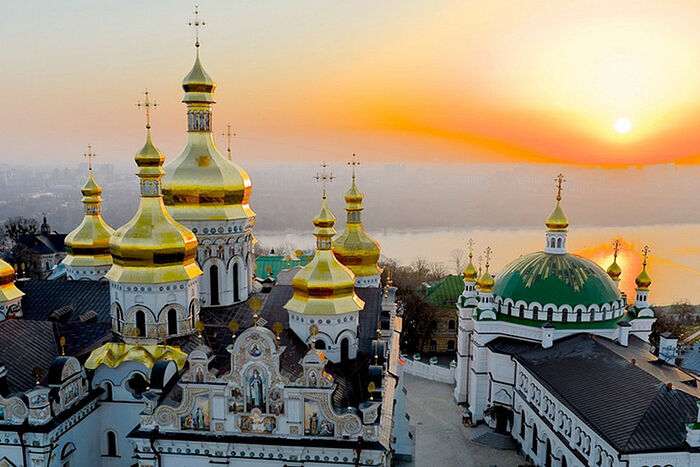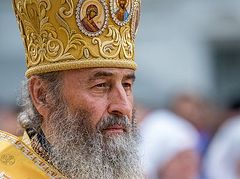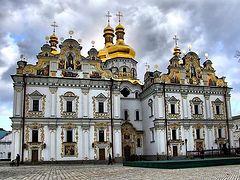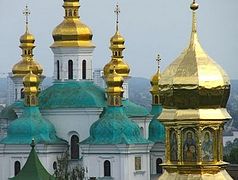Kiev, November 16, 2022
According to the press service of the Ukrainian Security Service (SBU), it “has opened criminal proceedings on the incident that occurred on November 12, 2022, in one of the churches of the Kiev Caves Lavra National Reserve, when,” as they allege, “propaganda praising the ‘Russian World’ was heard during a service in the church.”
As OrthoChristian reported on Monday, the schismatic priest Mykhailo Omelian posted a short clip on Saturday showing people singing a song with the words, “Mother Rus’ is waking up.” The song was written in 2004 to celebrate the reawakening of the Orthodox faith across the expanse of historical “Rus’—a term born in the first millennium and generally referring to the Slavic peoples of Novgorod, Kiev, and other areas of what are now Russia, Belorussia, and Ukraine.
According to Omelian: “On the territory of the Kiev Caves Lavra, on the 262nd day of the full-scale Russian invasion, they’re praying for Russia. What a horror!... People, how long will you support those who belong to the ‘church’ of the occupier?!”
The matter quickly turned into a scandal, and the SBU began to investigate. At the same time, Church figures investigated the video and came to the conclusion that it was doctored. Protodeacon Andrei Palchuk of the Odessa Diocese of the canonical Ukrainian Orthodox Church said the video’s metadata shows it had been worked on with a video editor before being published.
His Eminence Metropolitan Kliment of Nizhyn, the Chairman of the Ukrainian Synodal Information-Education Department, noted how strange it is that state law enforcement agencies are spending time investigating some women singing in a “video of dubious origin, with the same dubious distribution,” rather than more serious challenges facing Ukraine today.
At the same time, the Lavra published a video in which His Eminence Metropolitan Pavel of Vyshgorod, the abbot of the Lavra, stated that Hieromonk Zachary, the priest who was serving at the time, had been temporarily “forbidden to to serve the Liturgy or molebens” until a spiritual council of the monastery could be held to discuss the matter further.
“I’m sure Fr. Zachary himself wasn’t singing these songs,” Met. Pavel said. “We don’t sing secular songs in church, only the glorification of saints is sung in church… In church, we must pray for one thing—for peace, for a speedy end to the war.”
Further, Archimandrite Polycarp explained that the singing in the video happened after a moleben before the Icon of the Mother of God, “Queen of All”. After such services, the people often begin singing various spiritual songs of their own accord while the faithful are being anointed by the priest, he said. Thus, Fr. Zachary was busy anointing and speaking with the faithful, and wasn’t paying attention to what was being sung, Fr. Polycarp explained.
In his own comments, His Eminence Archbishop Viktor of Baryshevka emphasized that even if the video is genuine, it is nevertheless only a part of the information warfare being used to launch an attack against the entire Church. When someone from the National Police or the Parliament is found to have acted against Ukrainian state interests, no one proposes completely banning the Police or the Parliament, he emphasized. His Beatitude Metropolitan Onuphry of Kiev and All Ukraine and the UOC Synod have clearly stated the Church’s view of the war several times, Abp. Viktor emphasized.
The song
The song in the video was the “Song of the Most Holy Theotokos,” written by Nina Borodai. Though not a hymn of the Church, the poem, written in 2004, long before the present hostilities, is dedicated to the post-Soviet spiritual reawakening, the rebuilding and building of new churches, and the people’s hope in the prayers of the Mother of God.
Despite the statement of the SBU, the poem has nothing to do with the so-called “Russian World,” but rather speaks of the rebirth of Holy Rus’. The concept of Holy Rus’ refers to the new nation that was born to Christianity in the baptismal font of Kiev at the initiative of Holy Grand Prince Vladimir in 988. That nation, or people, includes what are now separately called Russians, Belorussians, and Ukrainians, who all continue to share the Orthodox faith.
While the schismatic priest Omelian characterizes it as a prayer for Russia in a time of war, the poem is completely apolitical. Rather, it is a prayer for the forgiveness of sins and the protection of the Mother of God, and spiritual joy in the sound of church bells ringing out across Holy Rus’. That a poem using the term Holy Rus’ is considered treasonous can only be an indication of the schismatic “church’s” persistent historical revisionism.
Follow OrthoChristian on Twitter, Vkontakte, Telegram, WhatsApp, MeWe, and Gab!





